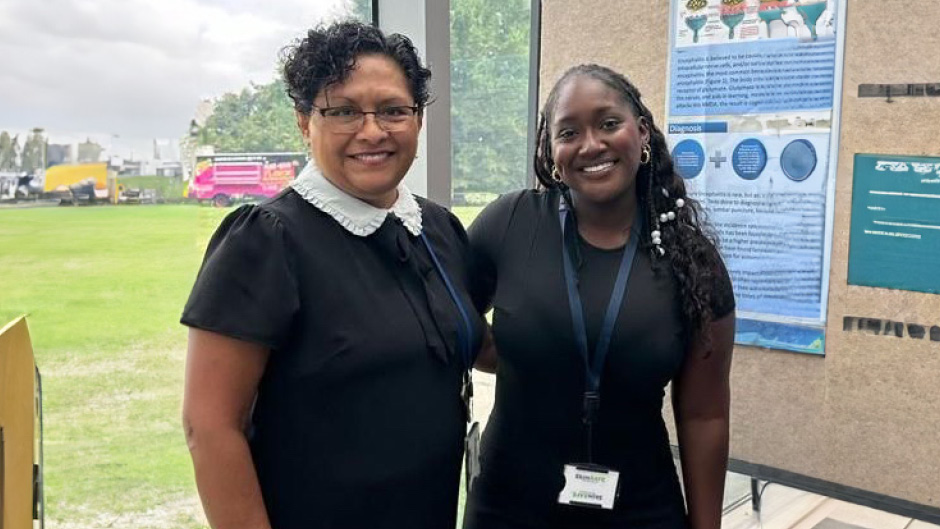Before the summer of 2023, junior nursing student Ophelia Hyde "wasn't that into research," she admits. “My idea was that it was behind the scenes in a lab, behind a computer. I diminished the impact it has. But research is not like that at all.”
What changed her mind was the chance for a hands-on research experience at the National Institutes of Health. Hyde, a University of Miami Foote Fellow, Hammond Scholar, and secretary of the School’s chapter of the Multicultural Nursing Student Association, was accepted into the very selective NIH Clinical Center Summer Internship Program in the nursing concentration.
“I was able to work in a functioning hospital with inpatient and outpatient units. The only difference is that all of the patients there are on protocols for research purposes,” she says. “I didn’t expect that. I thought I was going to be in the labs.”
Celebrating its 70th anniversary in 2023, the NIH Clinical Center is the nation's largest hospital solely dedicated to clinical research. Since it opened, more than 500,000 patients have participated in clinical trials there.
Hyde spent eight weeks shadowing nurse researchers in the hospital, which is located on the NIH campus in Bethesda, Maryland, just 15 minutes from where she grew up. Her mentor there was service nurse educator Rosa Rousseau, D.N.P., M.S.N. Ed., CHSE.
Hyde’s experience culminated in the NIH Summer Poster Day, where she and fellow interns presented their work and heard lectures from NIH investigators. For her final project, Hyde, who is pursuing minors in public health and psychology, elected to study the psychological impact of autoimmune encephalitis, an inflammatory condition of the brain she knew little about before her internship.
The condition, she learned, was identified as recently as the 2000s and seems to be more common among young people. It also disproportionately affects Black individuals and women. Moreover, because its symptoms can mimic those associated with schizophrenia, it is often misdiagnosed and treated as a psychiatric condition, Hyde explains. The poster she presented included input from NIH nurses working on the protocol and the physician in charge of it.
So far researchers have not linked the condition, which can have a sudden onset, to any genetic disorders and do not yet understand why it disproportionately affects certain populations, Hyde says. However, knowing that patients she encountered with severe symptoms will likely make a full recovery has inspired Hyde. “This is exactly why I went into the nursing field,” she says. “I want to address disparities like this. The treatment protocol was ongoing while I was at NIH, so I was able to see patients with autoimmune encephalitis receiving the treatment we had learned about.”
Witnessing the impact of her NIH mentors’ work first-hand convinced Hyde, who plans to specialize in women’s health or pediatrics after she graduates, of the transformative power of ethical, effective health research and its importance to her own future as a practitioner.
“I was able to meet patients with autoimmune encephalitis and talk to their parents,” she says. “I didn’t realize how important and crucial the work they’re doing at NIH is to everything that you do as a nurse, as a doctor. It completely impacts the way that you provide care for your patients. I feel like that was very essential for me to understand.”
While not every SONHS student can claim the NIH as their first research experience, all undergrads gain hands-on experience in health-related research at SONHS, through coursework, as well as internal and external opportunities like the one Hyde completed.
“Getting our students into research early in their education at SONHS broadens their comprehension of health in the modern world, opens more opportunities to them from the start, and expands their ability to think critically about the ways science can improve health care for all,” says Dr. Hudson Santos, Vice Dean for Research Affairs at SONHS.
Ophelia Hyde agrees. She feels empowered by her undergraduate research experience. Even though it’s been months since she met the young patients and their grateful parents at the NIH Clinical Center over the summer, she thinks of them often and remains focused on raising awareness about this devastating but very treatable condition.
“I knew nothing about clinical research nursing when I got into the internship,” she says. “This opportunity really sparked a passion I have for research that I didn’t think existed, and now I want to do more research. I want to keep this going.”
This article originally appeared in the Fall 2023 issue of Heartbeat magazine. For more information about undergraduate research opportunities, contact the Offices of Student Services and Hemispheric and Global Initiatives at SONHS and the Office of Undergraduate Research and Community Outreach at UM.

